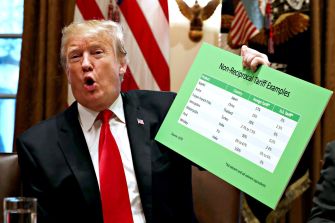A federal appeals court has ruled that President Donald Trump exceeded his authority when he invoked national emergency powers to impose sweeping tariffs on imports from nearly every country, dealing a major blow to one of his signature economic policies.
In a 7–4 decision issued on Friday, the U.S. Court of Appeals for the Federal Circuit largely upheld a May ruling by the U.S. Court of International Trade in New York, which struck down the tariffs as unlawful. The appellate panel concluded that the International Emergency Economic Powers Act (IEEPA), the statute on which Trump relied, does not grant presidents unlimited authority to impose tariffs. Instead, the court said, the Constitution places the power to levy import duties squarely in Congress’s hands.
“The statute neither mentions tariffs (or any of its synonyms) nor has procedural safeguards that contain clear limits on the President’s power to impose tariffs,” the court wrote, emphasizing that prior administrations had used IEEPA to impose sanctions, not broad trade restrictions.
While affirming that the tariffs exceeded Trump’s statutory authority, the appeals court declined to immediately freeze them. The panel sent the case back to the trade court to reconsider whether a nationwide injunction against the tariffs is appropriate, citing the U.S. Supreme Court’s recent guidance limiting the use of universal injunctions.
Trump, who has repeatedly defended tariffs as vital to restoring American manufacturing and creating leverage in international negotiations, blasted the ruling as “highly partisan” in a Truth Social post. He noted that the duties remain in effect while his administration considers an appeal to the Supreme Court.
The split decision revealed partisan divisions within the judiciary. Six of the seven judges in the majority were appointed by Democratic presidents, along with one appointee of George H.W. Bush. Of the four dissenters, two were appointed by Barack Obama and two by George W. Bush.
Trump has leaned heavily on tariffs since returning to office. In April, he rolled out what he called “reciprocal tariffs” against dozens of trading partners on “Liberation Day,” though many were later paused for negotiations. Earlier this month, he announced a new wave of duties on more than 60 countries, in some cases securing agreements that lowered the rates but still left them above pre-“Liberation Day” levels.
Supporters argue that tariffs are necessary to counter unfair trade practices, reduce reliance on foreign manufacturing, and generate billions in federal revenue. Trump has also tied tariff threats to non-economic issues, using them to pressure China over fentanyl, Mexico and Canada on immigration, and India over its trade ties with Russia.
Critics, however, contend that the tariffs harm U.S. consumers and businesses by raising prices and slowing growth. Many economists warn that steep duties could undermine the broader economy, while legal experts argue that Trump’s expansive use of emergency powers raises constitutional concerns. Some lawsuits against the tariffs cite the “major questions doctrine,” a legal principle often championed by conservative judges that limits executive action on issues of broad political or economic significance without explicit congressional approval.
What is IEEPA?
The International Emergency Economic Powers Act, enacted in 1977, allows presidents to regulate commerce in response to extraordinary foreign threats. The law is typically used to impose economic sanctions, freeze assets, or restrict financial transactions during crises such as terrorism or arms proliferation. It has rarely been used to alter tariff policy. Courts have now signaled that Congress did not intend IEEPA to serve as a blank check for presidents to rewrite trade policy, particularly given that the Constitution reserves taxing and tariff powers to the legislative branch.
Legal Analysis: The Major Questions Doctrine
The Federal Circuit’s reasoning mirrors the Supreme Court’s growing reliance on the major questions doctrine. That doctrine holds that when an agency, or in this case, the president, takes action with sweeping political and economic consequences, Congress must have clearly authorized it in statutory text. Without explicit language, courts presume the executive lacks such broad authority.
The Supreme Court has applied this doctrine in recent high-profile cases, such as West Virginia v. EPA (2022), where it struck down the Environmental Protection Agency’s attempt to impose wide-ranging climate regulations without clear congressional authorization. Similarly, in the tariff case, the appeals court emphasized that IEEPA does not mention tariffs at all, nor does it contain safeguards for imposing them. By applying this reasoning, the court aligned itself with a conservative legal trend that narrows executive discretion on matters of major economic importance.
Notably, the doctrine can cut both ways politically. While it has often been invoked by conservatives to block expansive regulatory action by Democratic administrations, here it was used to rein in a Republican president’s trade agenda. The case underscores that the doctrine is less about partisan politics than about separation of powers, raising fundamental questions about how far presidents of either party may stretch vague statutory language to reshape economic policy.
The latest ruling leaves Trump’s tariff program in place for now, but it remains under serious legal threat. With the issue likely headed to the Supreme Court, the future of the president’s trade agenda and the scope of executive authority in economic policy remain uncertain.






